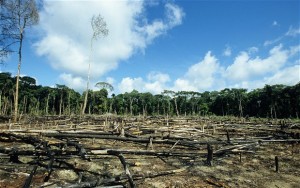Ahead of World Environment Day, Everland, which reportedly represents the largest portfolio of high-impact forest conservation (REDD+) projects in the world, has unveiled The Forest Plan, outlining an ambition to facilitate the development of up to 75 forest conservation projects in critical hotspots around the world. The plan was developed in response to pledges made by 141 countries at COP26 to end deforestation – a leading cause of climate change – by 2030.

The plan is said to incorporate the single largest voluntary carbon finance intervention to date, with one transaction alone expected to generate over $2 billion in financial flows over the next 10 years going to community-based forest conservation projects in the Global South.
The Forest Plan will further scale financing beyond this intervention with additional projects to be developed by Wildlife Works, the Wildlife Conservation Society, Wildlife Alliance, and other Everland partners.
The Forest Plan is science- and experience-based and focuses on addressing the root cause of forest loss: economics. It seeks to harness this knowledge into an effective response to two urgent planetary challenges – the climate crisis and loss of biodiversity – with the needed speed and scale. The plan has been shaped by respected experts and community leaders from around the world.
The Forest Plan centres on the development and implementation of voluntary, community-based forest conservation projects based on the UN mechanism known as REDD+ (Reducing Emissions from Deforestation and forest Degradation) and will bring together stakeholders from the forest floor to the boardroom to address these challenges.
Speaking at the launch of The Forest Plan, Joseph Mwakima, Community Relations Officer from the Kasigau Corridor REDD+ Project in Kenya, said: “The impact of the work being implemented by Wildlife Works has changed the lives of the community. Without a doubt, the REDD+ mechanism has brought sustainable livelihoods into our communities where there are now jobs, opportunities for building sustainable community-based enterprises and funding for schools and healthcare facilities.”
Under The Forest Plan, the project developers, communities, and governments leading this form of conservation work will be positioned to generate 90 million tons of verified emissions reductions (carbon credits) annually and over 800 million tons in total by 2030. The community-based projects that Everland represents, along with all other REDD+ projects, can protect a total of approximately 50.5 million hectares.
This is equivalent to 17% of the projected forest loss in 15 critical forest nations, including Brazil, the Democratic Republic of the Congo, Indonesia, Papua New Guinea and Cambodia. The projects represented by Everland alone will cover 23 million hectares.
Josh Tosteson, President of Everland, said: “Preserving forests is central to the climate fight, yet failures on past pledges have brought us to where we are today: carbon emissions from tropical deforestation this century are far higher than thought. With rates doubling in just two decades and continuing to accelerate, there is an urgency to act now. Perhaps more than anything else, the goal of The Forest Plan is to show that there is a legitimate, data-driven basis for hope. Through aligned, dedicated collective action and collaboration, we can, in fact, end deforestation.”
The Forest Plan will also support governments in forest nations to achieve Nationally Determined Contributions (NDCs) under their Paris Climate Agreement goals and access unprecedented private-sector resources to finance much-needed sustainable development in their countries. Businesses will play a central role in helping projects achieve the plan’s critical climate, community, governance, and biodiversity goals by voluntarily investing in the projects as part of their emission reduction plans to help compensate for their unavoidable emissions.
Everland will hold itself accountable by setting meaningful targets and goals, periodically and transparently reporting on the progress made against key performance indicators (KPIs). The Forest Plan’s targets, while ambitious, are only a part of what must be a much broader, collective effort to end deforestation. At the heart of what is needed is a collaboration that brings together both “top-down” (national/jurisdictional) and “bottom-up” (community project) approaches to tackling deforestation.
The plan serves as a call to action across four areas:
- Expanding high-impact, community-based REDD+ to its full potential.
- Enabling national and jurisdictional REDD+ programmes to achieve effective results.
- Prioritising rights of Indigenous Peoples and Local Communities (IPLCs).
- Empowering supply chain-based initiatives to end deforestation to achieve effective results.
